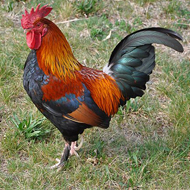
Nine arrests in one of the biggest cases in American history
Police in New York have rescued up to 3,000 birds and made nine arrests in the largest cockfighting case in its state history.
New York attorney general Eric Schneiderman announced the arrests on Facebook and said authorities had struck "A major blow against this vicious blood sport."
The American Society for the Prevention of Cruelty to Animals (ASPCA) has helped remove and shelter the birds.
"No animal should be forced to fight to the death, and we're proud to play a leading role in removing and caring for these victimised birds, as well as offering expert legal assistance in this case," said ASPCA president and chief executive Matthew Bershadker.
"This collaborative act of investigate, intervention and enforcement is a giant step toward our shared goal of wiping out cockfighting in America."
The weekend arrest followed a raid at a cockfighting event in Queens where rooster carcasses from birds killed earlier that night, were recovered. Fifty roosters were recovered from a Brooklyn pet shop, alongside hamsters, finches, rabbits and snakes.
As many as 3,000 roosters were recovered from a farm raided yesterday (9) morning.
"Our primary goal was to immediately remove these birds from a cycle of violence and suffering," said Stacy Wolf, senior vice president of the ASPCA anti cruelty group.
"We're proud to lend our expertise in partnership with the New York State Attorney General's office and to work alongside law enforcement agencies to help put an end to this heinous and senseless crime."
Image by Ziga



 HMRC has invited feedback to its communications regarding the employment status of locum vets and vet nurses.
HMRC has invited feedback to its communications regarding the employment status of locum vets and vet nurses.